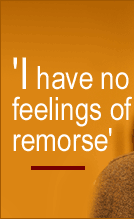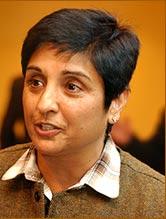Home > News > Interview
The Rediff Interview/Kiran Bedi, Civilian Police Advisor to UN
August 14, 2003


Kiran Bedi, the first and highest ranking woman in the Indian Police Service, turned 54 a few weeks ago. Bedi spent her birthday in New York, where she serves as Civilian Police Advisor to the United Nations. When Bedi escorted her interviewer from the front gates of the UN to her office, it was difficult for me to keep up with her pace. "Do you know you walk faster than an average New Yorker?" Bedi, a former Asian tennis champion, was asked, to which she promptly replied, "If I could I would never walk. I would just jog or even better, run."
Age has made little difference to the woman who was governor of the largest correctional (predominantly male) facility in the world — Tihar Jail in Delhi — which housed more than 10,000 inmates. With exceptional vision, Bedi implemented what are still considered revolutionary measures to reform prisoners, including yoga and sports activities.
Little wonder, then, that when Bedi walks the streets of any big city in the US, she gets "hundred percent recognition from Indian faces.''
A few days before she left for a mission to Kosovo in Europe, Bedi spoke to Shakti Bhatt.
What was your reaction at being offered the job at the UN?
It was a mixed bag. I was in the Special Commission in the Delhi Police. It was a very good position and a nice assignment. I had a good team and it was home. I got my promotion and was part of a core team. But the UN position was outstanding for an Indian. It was considered with general enthusiasm and I received it in a similar way.
How is your work different now?
My job at home was more hands-on and I am more comfortable with that. Here there is more pen and paper. It's more theoretical though I have a great team which encompasses 16 nationalities. The challenge as far as diversity presents (itself) is exciting. At home, I have a ready team, whereas here I have to build one.
How have the past six months in your new job been?
I kept delaying my field missions for months because I wanted to thoroughly understand [the UN's] headquarter operations because you know, you don't want to make a goof. I wanted to find out what kind of advice they wanted.
How is the UN using your expertise to deal with policing issues in countries like East Timor?
My whole experience is beneficial to the UN. We are looking at the concept of country policing in failed States which requires not only a refurbishment but a renewal of their systems. It is like a back to school program for failed States where they have to unlearn their skills after their collapse and work with the UN to build new ones. The biggest indicator of good governance is security. No security means no growth. We deal with everything from recruitment to training to setting up police academies to management to administration to establishing procedures and so on.
Is that overwhelming?
It isn't overwhelming because you have resources to back you up. We are only one part of a 500-strong peacekeeping force which in part of the Department of Peacekeeping Operations. We have a huge backup as far as military and logistics are concerned.
Since you now deal not with one country but several all over the world, is your job satisfaction greater than in India?
Job satisfaction is greater back home because there is greater visibility of the receiver. Here we have more anonymity. Over [in India] you cook for somebody and see them enjoying and tasting it. Here you cook and you don't know if it's liked, who is eating it or whether it is being eaten at all. The joy of satisfaction which I am really used to is not here.
What is it to live in New York City alone?
When I came here before, I used to shop all the time. Now the focus is on work. Work and back home. Work and back home.
During your book launch, you read a story from your book As I See about Indian-Americans coming together for a cause to benefit India. Is that something you feel strongly about?
I would love to see them coming together and take up a cause for India. I find them very well organized and prosperous but in segments. I would love to see them have a common program. They can take up one individual cause like girl education. That will be visible and impacting. It will then not be a drop in the ocean but rivers and lakes. Not little pipes or rivulets, but big ponds and oasis.
What would you say about the changing face of the Indian woman?
As far as their development is concerned, it's a natural process. If you want to hasten that process, you have to create lakes [smiles].
You joined the Indian police force more than 30 years ago. Have things become easier for women to join and be a part of it since then?
It was always easy. Now mindsets have opened and yes, there are many more capable women now.
How do you explain the paradox where the Indian police is on one hand considered irredeemably corrupt and on the other is one of the few in the world that has been conducive to the success of a woman like you?
It is this paradox that attracted me to the police force. The moon is dark on one side and bright on the other. It is the brightness of the Indian Police Service that attracted me and that brightness, as I saw it, was the power to correct. I saw the corrupt side but I knew what I could do with what I had.
You mean what you did at Tihar?
Yes. What we did at Tihar is unparalleled. It was a holistic program which had everything from training to education to ethics to spirituality. We created an inbuilt program that though not compulsory was trusted and attended by everybody.
Do you think it has been managed well after you left?
Maybe not as enthusiastically.
Was it difficult to leave the jail and the program where you had invested so much?
I am a Gemini. We have split personalities. While at work, I am fully in it. I can be attached yet very detached. I have no feelings of remorse.
Wasn't It's Always Possible [a collection of Bedi's experiences in India and the US] to be written by a ghostwriter?
Yes, but it was not good work. There was no information and the spirit was missing. They (the publishers) changed the writer midway. I asked them, 'Am I going to now train the other one all over again?' I fought back, saying it's unethical and it's not acceptable to me. They (the publishers) sued me. Ultimately we had an out of court settlement.
I am not writing for money, I am writing to document. I was tremendously satisfied with the result. I was surprised that I liked writing so much. Now anytime I get an inspiring thought I immediately write it down.
As a writer who mostly writes about her experiences, does memory serve you well?
Yes, quite well.
Can you remember your first day in the police?
My first day in the police was July 16, 1972. I was the only woman in the IPS. I remember getting a lot of questions. Are you sure you want to do this? Have you thought about your family? Why did you choose to be here? There was a lot of amazement and doubt. I kept telling myself 'don't change your mind.' I was going by my swadharm [self-religion].
Will you miss New York after your one-year appointment with the UN comes to an end?
Never. I may miss it but home is home.
Which question are you asked most often?
I am usually asked about the dichotomies and paradoxes of India. I explain to them that India is a continent with three sections -- the underdeveloped, developing, and developed. According to your experience you may find any of these situations true.
Where does what happened in Gujarat last year fit?
What happened in Gujarat is the product of a politicized system. It was a situation where a person allowed himself to be used by a user. It was not a systemic failure but a situational failure.
Photograph: Paresh Gandhi